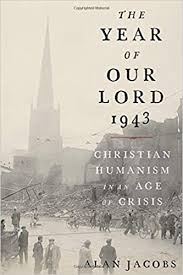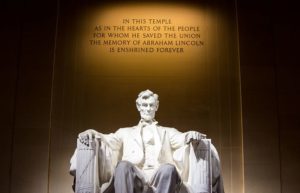Is democracy worth fighting for and even dying for? Does it need greater goals than itself? What should be the shape of our social order?
In an era gone by, Christian thought leaders believed they had a public role in answering such questions, and the public thought they did too. In 1943, as the Allies began to realize that victory over the Axis powers was inevitable, the independent work of five key intellectuals coalesced in remarkable ways concerning what the post-war world should look like.
 In that year a French Catholic philosopher, a British poet living in America, an American poet now a British citizen, a French mystic working for the resistance in England, and an Oxford Don gave lectures, wrote poetry, produced books, and spoke on the BBC. The five—Jacques Maritain, W. H. Auden, T. S. Eliot, Simone Weil, and C. S. Lewis—all addressed the larger questions of society and politics for what would soon become the post-war world. Taking up themes of education, the demonic, and force, all asked how Christian perspectives might inform such answers.
In that year a French Catholic philosopher, a British poet living in America, an American poet now a British citizen, a French mystic working for the resistance in England, and an Oxford Don gave lectures, wrote poetry, produced books, and spoke on the BBC. The five—Jacques Maritain, W. H. Auden, T. S. Eliot, Simone Weil, and C. S. Lewis—all addressed the larger questions of society and politics for what would soon become the post-war world. Taking up themes of education, the demonic, and force, all asked how Christian perspectives might inform such answers.
Since the Allies used the methods of mechanized, technocratic warfare against the Fascist powers who employed the same techniques, the five wondered, What was needed so that we would not become like them? Despite the best efforts of these intellectual powerhouses to point society in a different direction (spoiler alert here), they failed. Such thinking and warnings were overwhelmed by the ultimately dehumanizing technological worldview that had been employed to win the war—and which would permeate the peace.
Of the five, only Jacques Maritain actually engaged substantively in the world of politics after the war as the French ambassador to the Vatican. Weil died and the others moved on to other concerns.
Alan Jacobs concludes his book The Year of Our Lord 1943 with an afterward about a somewhat younger Frenchman who had many of the same concerns as the five—Jacques Ellul. His conclusion about what Christians ought to do in such times is outrageous for the age we live in. I will not spoil the shock of that recommendation here but will encourage you to read it.
 The unwritten agenda of this book and its relevance for today seems to be the similar questions that are now afoot. Does democracy have a future? Can it withstand the impulses of our now hyper technological society joined with the forces of nationalism which once more assert themselves–now in currently democratic societies like Great Britain, India, the United States and elsewhere? What role if any does Christianity have to play other than chaplain to the powers or hand-wringing bystander?
The unwritten agenda of this book and its relevance for today seems to be the similar questions that are now afoot. Does democracy have a future? Can it withstand the impulses of our now hyper technological society joined with the forces of nationalism which once more assert themselves–now in currently democratic societies like Great Britain, India, the United States and elsewhere? What role if any does Christianity have to play other than chaplain to the powers or hand-wringing bystander?
——
photo credit: Pixabay/Mark Thomas
